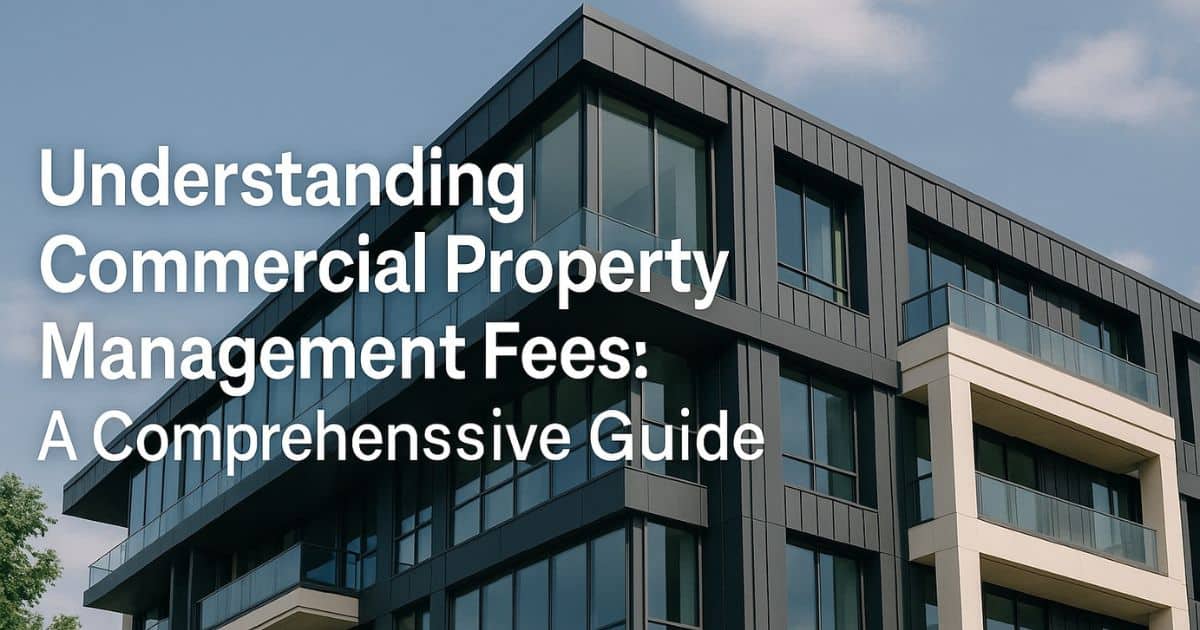Commercial property management is essential for property owners who want to ensure their properties are maintained, tenants are managed, and everything runs smoothly. This comprehensive guide will delve into the intricacies of commercial property management fees, their structures, and how they are calculated.
Whether you’re a first-time investor or a seasoned real estate owner, understanding these fees is critical to your investment’s profitability. Learn how fees are structured, what they cover, and how you can negotiate them to maximize your returns.
Table of Contents
What Are Commercial Property Management Fees?
Commercial property management fees are the charges that property owners pay to management companies for the day-to-day operations of their properties. These fees cover various tasks such as maintenance, tenant management, leasing, and administrative duties.
Typical Commercial Property Management Fees
The typical fee for commercial property management can range between 3% to 10% of the monthly rent. However, this varies depending on the property’s location, size, and type (e.g., office, retail, industrial). Property management companies charge these fees to cover their time, resources, and expertise in maintaining a property’s functionality.
Understanding the Fee Structure
There are several ways property management companies structure their fees. The most common structure includes a flat fee or a percentage-based fee. In some cases, property owners may negotiate a hybrid fee that combines both structures, depending on the services provided.
Key Components of Commercial Property Management Fees
1. Management Fees
Management fees are typically the largest portion of a property management company’s charges. These fees cover the management of tenant relations, including rent collection, lease renewals, and maintenance scheduling. A flat fee or a percentage of the rent are common structures.
2. Maintenance Fees
Property maintenance is an essential aspect of property management. Fees for maintenance services can include repairs, HVAC management, landscaping, and more. These fees vary depending on the scope and frequency of the required maintenance.
3. Leasing Fees
Leasing fees are paid when the management company helps find new tenants. This can include advertising the property, showing it to potential tenants, and handling lease negotiations. Leasing fees can be a one-time fee, typically a percentage of the first month’s rent.
Calculating Commercial Property Management Fees
How Are Commercial Property Management Fees Calculated?
Commercial property management fees are calculated based on the gross rental income generated by the property. A typical property management company might charge anywhere between 3% and 10% of the monthly rent. The percentage is often negotiable, depending on the size and location of the property.
Some property management companies may also charge additional fees for services such as property inspections, evictions, and specialized maintenance. Property owners should be sure to read through their contract to fully understand what is included in the management fee and what might incur additional charges.
Example of Fee Calculation
For example, if a commercial property generates $10,000 in monthly rent, and the management fee is 5%, the owner would pay $500 per month for management services. Additional fees, such as leasing or maintenance, would be calculated separately.
Additional Fees Every Investor Should Budget
| Fee Type | Typical Range | Why It Exists (What the Fee Covers) |
|---|---|---|
| Leasing / Lease-Up Fee | 50 %–100 % of one month’s rent | Marketing, tours, screening, legal documentation |
| Lease Renewal Fee | 10 %–25 % of one month’s rent | Negotiation & paperwork to keep a performing tenant |
| Maintenance Mark-Up | ~10 % of vendor invoice | Vendor vetting, scheduling, quality control |
| Project Management Fee | 3 %–5 % of cap-ex budget | Oversight of major renovations |
| Eviction Processing | $750–$1 500 flat | Legal filings, court appearances |

Luxury Property Appraisal: Main Factors That Impact Luxury Property Value


4D Property Solutions: The Best Guide for Property Management in Louis, Missouri
Factors That Influence Property Management Fees
Several factors can affect the fee structure for commercial properties:
1. Property Type
Different types of commercial properties (e.g., office buildings, retail spaces, industrial properties) may require different levels of attention and management, affecting the fees.
2. Property Size and Location
Larger properties or those in prime locations tend to have higher management fees due to the increased complexity of operations. Similarly, properties in major metropolitan areas may command higher fees than those in rural or less-popular regions.
3. Level of Service
Property management companies offer different levels of service. Some may only manage the property’s day-to-day operations, while others may offer comprehensive services, including marketing, legal support, and financial management. These services will directly impact the fee structure.
4. Market Trends
The real estate market can influence commercial property management fees. In areas with high demand for commercial spaces, management companies may charge a premium for their services.
Typical Commercial Property Management Fee Structures
Property management fees for commercial real estate typically follow one of the below structures:
Percentage-Based Fees
This is the most common structure. The property management company charges a percentage of the monthly rent, usually between 3% and 10%. This aligns the interests of the property manager with the property owner since higher rent equals higher fees for the manager.
Flat Fees
Some property management companies charge a flat monthly fee, regardless of the rental income. This structure may be used for smaller properties or those where rent income is not very high.
Hybrid Fees
In some cases, a hybrid fee structure is used. This combines elements of both percentage-based and flat fees, depending on the service level or tasks involved.
Case Study: 120-Unit Mixed-Use Asset, Chicago Loop
Pre-Management: 14 % vacancy, NOI $1 400 000
Post-Hiring a Professional Property Manager:
| Metric | Before | After 12 Months |
|---|---|---|
| Occupancy | 86 % | 96 % |
| Average Rent | $38 / sf | $41 / sf |
| Annual Management Fee | — | 8 % of rent ($153 000) |
| NOI | $1 400 000 | $1 730 000 |
Net gain outweighs higher fees by $180 000—proof that fees compensate the property manager for value creation.
Negotiating Property Management Fees
How to Negotiate Property Management Fees
Property owners can often negotiate the management fee structure with property management companies. For example, owners with multiple properties or large commercial spaces may have more leverage to secure lower fees.
It’s important for property owners to clearly understand what services are included in the fee and whether additional costs may arise during the management of the property.
Summary of Key Points
Management fees typically range from 3% to 10% of the monthly rent, based on property size, type, and location.
Maintenance and leasing fees can also contribute significantly to the total cost of property management.
Negotiation of fees is often possible, especially for larger properties or portfolios.
Understanding the fee structure and services provided is essential to ensure you are getting good value for the fees paid.
Conclusion
Commercial property management fees are a vital component of property investment. Understanding the different types of fees, how they are calculated, and the factors influencing these costs will empower property owners to make better decisions and negotiate effectively. Whether you own a small office building or a large shopping center, knowing the ins and outs of property management fees will help you manage your investment more efficiently and profitably.
FAQs
1. How are commercial property management fees calculated?
Management fees are typically calculated as a percentage of the property’s monthly rent, usually between 3% and 10%.
2. Can property management fees be negotiated?
Yes, property owners can often negotiate the management fee, especially for larger properties or portfolios.
3. What do commercial property management fees cover?
These fees cover a range of services, including tenant management, property maintenance, leasing, and administrative tasks.
4. What is a typical commercial property management fee?
A typical commercial property management fee is usually between 3% and 10% of the property’s monthly rent.
5. Are property management fees tax deductible?
In most cases, commercial property management fees are tax-deductible as part of the operating expenses of the property.
6. What is the average commercial property management fee?
The average fee across all commercial property types approximates 4% to 6% of gross rental income.
7. What is a reasonable management fee?
Reasonable fees depend on property type, location, and services included. Office properties reasonably pay 3% to 5%, retail properties 4% to 7%, and industrial properties 3% to 4% of gross rental income.
External Trustworthy Links
National Association of Realtors (NAR) – Property Management
NAR provides authoritative insights and resources on commercial real estate, including property management. A trusted industry source for real estate investors and property owners.Bureau of Labor Statistics (BLS) – Property, Real Estate, and Community Association Managers
A government-backed source offering valuable data and insights on property management salaries, roles, and responsibilities.Property Management Association
The Property Management Association provides professional guidelines, resources, and best practices for property management companies, making it a credible external reference.Commercial Real Estate Resource – Commercial Property Management
This link offers expert advice on property management within the commercial real estate sector, particularly useful for understanding fee structures and practices.Real Property Management
A trusted real estate property management company providing valuable information about managing commercial properties, including insights on fees and operations.Investopedia – Property Management Fees and Charges
A trusted financial resource offering a breakdown of property management fees, including typical charges and how fees are calculated.The Balance Small Business – Property Management Fees Explained
A highly credible source providing an overview of property management fees and the factors that affect these costs, perfect for educating readers.American Real Estate Society – Property Management Resources
The American Real Estate Society offers in-depth research and knowledge regarding real estate management, enhancing the credibility of your content.Commercial Property Management – Forbes
A highly reputable business publication offering an article that explains how property management fees affect real estate investing, providing a trusted external reference.


Join The Discussion